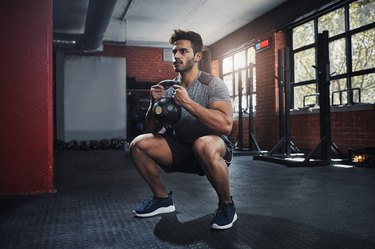
From a functional standpoint, squats are one of the best exercises you can include in your workout program. This isn't just about your legs (even though squats are a great way to build stronger quads, hamstrings and glutes). Squatting is a fundamental pattern that's basic to human movement, according to the National Academy of Sports Medicine (NASM). (Think: sitting into a chair or picking a pen up off the ground.)
No matter your age, regularly performing squats can help protect you from injuries related to a sedentary lifestyle. Squats can also be a heart healthy exercise, depending on your repetition tempo. Forget the butt- and mind-numbing stationary bike or elliptical machine; quick sets of higher rep squats will jack up your heart rate to near sprint-like levels.
Video of the Day
Video of the Day
Finally, squatting can be a mentally stimulating exercise. The varieties of squat modifications are seemingly endless. When you begin loading the basic squat with weight, the options open up even wider and will skyrocket your performance, shed body fat and improve your posture and bone health.
Read more: The 30-Day Squat Challenge
Squats Improve Performance, Power & Strength
Whether your goal is to finally dunk a basketball in your rec league, look great for the beach or simply be able to bound up stairs two at a time, squats can help you gain more power in your legs, lift your glutes and give your body some more mobility.
In order to perform a squat, your body activates about 200 upper and lower body muscles, according to NASM. While this exercise mainly targets the quadriceps, glutes, and hamstrings, both the upper and lower body must work in unison. You can even pinpoint which major muscles you'd like to isolate. If increasing quadricep strength is your goal, keep your squats above 90 degrees. On the other hand, if you're looking to strengthen your hip flexors, deepen your squat.
In addition to muscular strength, squats improve your muscular power. Power is the ability to apply a lot of force in a minimum amount of time, making it important in both athletics and many everyday activities. Using squats in plyometric exercises (jumping style exercises that demand maximum muscular power) can increase your muscular power. Exercises like jump squats or box jumps are great ways to increase your power with squats.
Squats Can Torch Calories
Squats are not only a great total-body muscle-building exercise, they're also a great way to boost your metabolism. Your metabolism is the process that transforms the calories from foods you eat and drink into energy, according to the Mayo Clinic. The speed of your metabolism also determines how many calories you burn simply breathing or digesting food (also known as your metabolic rate).
Your metabolism is determined largely by your body size and composition. If your body is composed of mostly fat, your metabolic rate is slower and your body burns less calories each day. On the other hand, if you have higher muscle mass, your metabolism is faster and burns more calories simply performing everyday tasks.
Since your muscle mass plays a role in determining the speed of your metabolism, squats are a great way to torch calories. Considering the amount of muscles that squats target across your entire body, this exercise can build your muscle mass and rev up your metabolism.
Squats Improve Posture, Movement & Bone Density
Finally, and arguably most important of all, squats help offset many of the muscular imbalances and weaknesses that we accumulate in our daily lives. As we spend so much of our days seated at a desk, proper posture has taken a hit.
Yet, have you ever watched a two-year old bend down to pick something up off the floor? It's a picture-perfect squat every time. Squatting helps you relearn this essential pattern and alleviate many of the issues related to being sedentary. The glute-strengthening impact of regular squats will also help stabilize your hips, which often grow weak with extended periods of sitting, according to NASM (not to mention contribute to knee pain).
Regularly performing squats, especially with resistance, can also improve your bone health, according to the University of California Berkeley. By increasing stress on the bones, resistance training can increase bone density.
So what are you waiting for? If you workout routine doesn't already contain squats, it should! Begin by mastering proper squat form, throw in some squat variations and maybe even join the LIVESTRONG.com Squat Challenge. Your booty (and legs) will thank you.
- National Academy of Sports Medicine: "SQUAT FORM – WHAT DOES IT TELL US? PART 1"
- Mayo Clinic: "Metabolism and weight loss: How you burn calories"
- National Academy of Sports Medicine: "7 WAYS TO EFFECTIVELY BUILD STRONGER, LARGER GLUTES!"
- University of California Berkeley: "Lift Lighter Weights for Stronger Bones?"